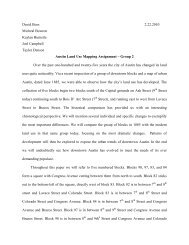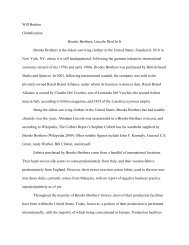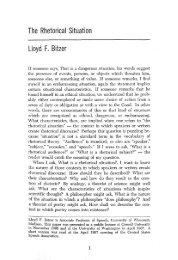Imitation and Gender Insubordination
Imitation and Gender Insubordination
Imitation and Gender Insubordination
You also want an ePaper? Increase the reach of your titles
YUMPU automatically turns print PDFs into web optimized ePapers that Google loves.
<strong>Imitation</strong> <strong>and</strong> <strong>Gender</strong><br />
<strong>Insubordination</strong><br />
Judith Butler<br />
Hillary Chiou<br />
Kai Clark<br />
Lindsey Maxon
Judith Butler<br />
• Born February 24, 1956<br />
• American post-structuralist philosopher,<br />
who has contributed to the fields of<br />
feminism, queer theory, political philosophy,<br />
<strong>and</strong> ethics<br />
• She is the Maxine Elliot professor in the<br />
Rhetoric <strong>and</strong> Comparative Literature<br />
departments at the University of California,<br />
Berkeley<br />
• Received her Ph.D. in philosophy from Yale<br />
University in 1984, for a dissertation<br />
subsequently published as Subjects of<br />
Desire: Hegelian Reflections in Twentieth-<br />
Century France<br />
• In the late-1980s held several teaching/<br />
research appointments, <strong>and</strong> was involved in<br />
“post-structuralist” efforts within Western<br />
feminist theory to question the<br />
“presuppositional terms” of feminism<br />
• Research ranges from literary theory,<br />
modern philosophical fiction, feminist <strong>and</strong><br />
sexuality studies, to 19th- <strong>and</strong> 20th-century<br />
European literature <strong>and</strong> philosophy, Kafka<br />
<strong>and</strong> loss, mourning <strong>and</strong> war
Butler’s Works<br />
• <strong>Gender</strong> Trouble: Feminism <strong>and</strong> the<br />
Subversion of Identity (1990)<br />
• Bodies That Matter: On the<br />
Discursive Limits of “Sex” (1993)<br />
• Excitable Speech: A Politics of the<br />
Performative (1997)<br />
• Undoing <strong>Gender</strong> (2004)<br />
• Giving an Account of Oneself (2005)
What’s a sexuality<br />
•“phantasy structure”<br />
•act<br />
Here<br />
•orifice<br />
•gender<br />
Here<br />
•anatomy<br />
Here
What’s a sexuality<br />
Not what you ARE,<br />
but what you claim<br />
to NOT be.<br />
=<br />
There’s no set definition for any<br />
sexuality. It can only be defined<br />
by the sexualities it isn’t.
Why define sexuality<br />
Political purposes<br />
Can’t ask for<br />
equal rights<br />
if nobody<br />
knows what<br />
you’re talking<br />
about<br />
!!!
Why define sexuality<br />
Political purposes<br />
<br />
This is an outrage!<br />
Gay men shouldn’t<br />
exist! Everyone<br />
should be straight!
Why define sexuality<br />
Political purposes<br />
But what about<br />
the lesbians<br />
Don’t be silly,<br />
lesbians don’t<br />
exist.
Why define sexuality<br />
Political purposes<br />
If one category is prohibited, you<br />
can fight the prohibition; if another<br />
category doesn’t even “exist,” how<br />
do you establish it as valid<br />
Hey baby,<br />
you single
Why define sexuality<br />
So that it isn’t defined in<br />
comparison to heterosexuality<br />
It’s easy in a<br />
homophobic<br />
mindset to define<br />
homosexuality as<br />
a derivative of<br />
heterosexuality<br />
#1<br />
(or, as nonexistent)<br />
#3<br />
#2
Where does gender<br />
come from<br />
Generally seen as<br />
based on a default<br />
Females = feminine<br />
Males = masculine
Where does gender<br />
come from<br />
Therefore, drag is seen<br />
as a an imitation of<br />
the opposite gender
But the idea of<br />
“gender” itself is<br />
completely made up<br />
Where does gender<br />
come from<br />
Female ≠ feminine<br />
Male ≠ masculine
Where does gender<br />
come from<br />
“Drag” reveals<br />
that gender is<br />
not set in stone,<br />
it’s acted.<br />
!!!<br />
<strong>Gender</strong> performativity<br />
This is the key word you should be taking notes on, guys.
What about sexuality<br />
Heterosexuality is seen as the<br />
origin. Other sexualities are<br />
derivative from this origin.
What about sexuality<br />
But the idea of heterosexuality depends<br />
on the idea of homosexuality.
What about sexuality<br />
But, because homosexuality is viewed as a “copy”<br />
of heterosexuality, it cannot be the original.<br />
Heterosexuality is the copy of the copy.
What about sexuality<br />
It’s an endless cycle
What about sexuality<br />
Like gender, heterosexuality is<br />
based on an (imaginary) ideal
What about sexuality<br />
Because it cannot live up to<br />
its own ideal, it repeatedly<br />
performs its sexuality as the<br />
only way to sustain it
If it stops performing it, it<br />
stops existing, because<br />
sexuality is defined by<br />
what it DOES instead of<br />
what it IS.<br />
What about sexuality
Paris Is Burning<br />
“Realness”: because gender is performed, drag<br />
makes a biological male into a “real” female.
• <strong>Gender</strong> is the effect of reiterated acting<br />
• Produces the effect of a static or normal gender while<br />
obscuring the contradiction <strong>and</strong> instability of any single<br />
person’s gender act<br />
• This effect produces what we can consider to be “true<br />
gender,” a narrative that is sustained by “the tacit<br />
collective agreement to perform, produce, <strong>and</strong> sustain<br />
discrete <strong>and</strong> polar genders as cultural fictions is obscured<br />
by the credibility of those productions—<strong>and</strong> the<br />
punishments that attend not agreeing to believe in them.”<br />
• The performative acts which Butler is discussing she<br />
names to be performative <strong>and</strong> within the larger social,<br />
unseen world, they exist within performativity.
• The socially constructed aspect of gender performativity is<br />
perhaps most obvious in drag performance, which offers a<br />
rudimentary underst<strong>and</strong>ing of gender binaries in its<br />
emphasis on gender performance<br />
• Butler underst<strong>and</strong>s drag cannot be regarded as an example<br />
of subjective or singular identity, where “there is a ‘one’<br />
who is prior to gender, a one who goes to the wardrobe of<br />
gender decides with deliberation which gender it will be<br />
today”<br />
• Subsequently, drag should not be considered the honest<br />
expression of its performer’s intent<br />
• Rather, Butler suggests that what is performed “can only be<br />
understood through reference to what is barred from the<br />
signifier within the domain of corporeal legibility.”
“Original” sexuality<br />
http://www.youtube.com/watchv=zKAW96N-Vms









